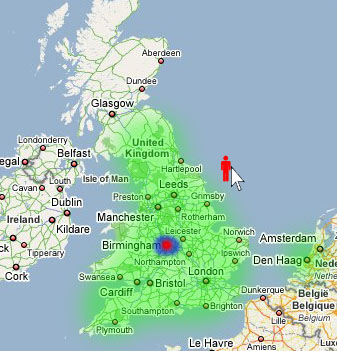I’ve been experimenting with my.loki.com, which aims to automatically update your position in the world (and it’s scarily accurate), it will also share that information with other web services if you allow it. FireEagle from Yahoo is to offer the sharing too, if not the automatic stuff. It’s helped me think around a topic that’s been sitting in my brain – I’ve been thinking about how to model our relationship with notions of place and identity in a way that web services can use. The mark-up itself is not something I’ve been worried about just yet, but I’ve been thinking about the sheer amount of data we need.
GPS on our smartphones will no doubt be able to provide up-to-the-minute geo-data of our actual positions to web-services in the near future, by there are any number of other places that will inform our areas of interest in news or events. In the same way that attention data will build and share what we’re interested in, we’ll need to build geo-attention data – of our physical places of interest. Some may be gathered by the same means, based on the attention we pay to geo-located items of news, but some we’ll have to set:
 Where I Live – I set this now, on Facebook at least with the neighbourhoods app.
Where I Live – I set this now, on Facebook at least with the neighbourhoods app.
My Region – the wider city or county. This you would think would be a simple one, but administrative boundaries bear very little relation to the ones that exist in our head. Witness the endless debates about what’s ‘The Black Country’ or what is or isn’t in Birmingham. Different bodies also have wildly different views on what is contained in a region (an example int he comments here).
My Country – An easy extrapolation, in most cases, border disputes notwithstanding.
My home town/country – I live in the city/country I was born, but if I didn’t there would still be types of news I would want from them.
Where I am – a job for loki, or FireEagle or their successors.
Where I’m going – there are certain things you want to know about the future, social travel sites or your calendar may offer this data, if we can get it out.
Where my friends are –or any other relationship you may have with a place. This can only really be set by you, but a mechanism to do it is needed.
While geo-tagging news or events is developing on point data (and may need to expand this in some way to be useful), many of our geo-attention centres are even fuzzier. Geo-attention profiling based on these news items will be crucial, but there are other things needed. Geo-attention data needs to start with either squares of long/lat or even HTML image-map style regions, and then fuzz them – creating “geo-attention heat-maps”.
There are still areas that require our input – I’d be willing to set them if I got me the targeted content that saved me time and I’m sure others would too. The data is so complex that is needs to be open, transferable and easy to apply, but it may be some of the most important knowledge of our habits that can be used to improve the quality of information we get.
Comments are closed